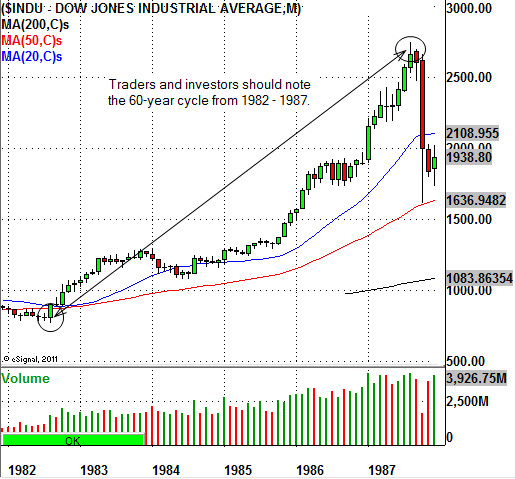Every bull and bear market has a life span before it ends. So often, traders and investors that simply follow the news and fundamentals think that the current trend can last forever, but we all know that is not true. In 2007, it took three small stock market crashes before the public realized that the bull market was ending and a strong bear market was about to begin.
Here are three reasons why the current bull market is on borrowed time and could be ending very soon.
1. Most bull markets last around 50 to 67 months. This bull market is about to reach its 60 month anniversary on March 6th, 2014. While bull markets don't just die on the exact anniversary date, it should signal to traders that it is long in the tooth and very mature at this stage of the game. Ironically, the bull market that began in 1982 lasted roughly 60 months before the 1987 stock market crash. The same time period was again seen from the 2002 low to the 2007 high, this was 60 months. So any trader or investor with half of a brain should take note of this current 60-month cycle. The one coincidence of the 60-month bull markets of the past was primarily due to easy money by the Federal Reserve, this time no different.
2. The Federal Reserve Bank has ballooned its balance sheet to over $4 trillion. It will be a very tough task for the central bank to unwind that gigantic number. Currently, the Federal Reserve Bank is trying to unwind its QE-3 (quantitative easing) program by tapering its monthly purchases. Once the central bank starts to ease the amount of created money it should cause major problems. This tapering will soon hurt the equity markets as less U.S. Treasuries and mortgage backed securities (MBS) are purchased each month.
3. Other countries are starting to feel the pressures of inflation. Countries such as Brazil, India, Ukraine, Venezuela, Thailand, Syria, Bosnia, South Africa, Turkey, and many other countries are dealing with the rise in food prices. Civil unrest has already started to occur in many of these countries due to price inflation. Higher interest rates are really the only way to bring down food inflation. Unfortunately, when higher interest rates occur the economy will usually slow down. Remember, while easy money helps to lift asset prices it does also lift food and energy prices as well. Food and energy are really what people need to survive. The central bankers who run the monetary policy around the world have to be looking at the high food prices, and they will all need to start pulling back on the easy money policies that have been in place for over five years now.
While the writing on the wall is obvious to any intelligent trader or investor; one thing we know is that regardless of the market direction, up or down, there is always a trade. All we look for is the continued volatility, as that is what creates great opportunity for us to profit.
Nicholas Santiago
InTheMoneyStocks.com
